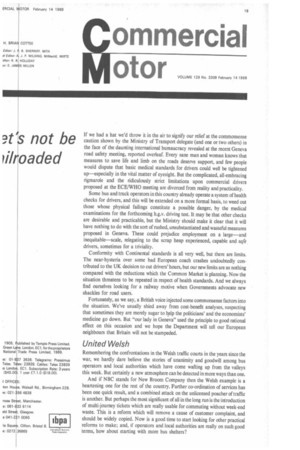ommercial otor
Page 21

If you've noticed an error in this article please click here to report it so we can fix it.
If we had a hat we'd throw it in the air to signify our relief at the commonsense caution shown by the Ministry of Transport delegate (and one or two others) in the face of the daunting international bureaucracy revealed at the recent Geneva road safety meeting, reported overleaf. Every sane man and woman knows that measures to save life and limb on the roads deserve support, and few people would dispute that basic medical standards for drivers could well be tightened up—especially in the vital matter of eyesight. But the complicated, all-embracing rigmarole and the ridiculously strict limitations upon commercial drivers proposed at the ECE/WHO meeting are divorced from reality and practicality.
Some bus and truck operators in this country already operate a system of health checks for drivers, and this will be extended on a more formal basis, to weed out those whose physical failings constitute a possible danger, by the medical examinations for the forthcoming h.g.v. driving test. It may be that other checks are desirable and practicable, but the Ministry should make it clear that it will have nothing to do with the sort of rushed, unsubstantiated and wasteful measures proposed in Geneva. These could prejudice employment on a large—and inequitable—scale, relegating to the scrap heap experienced, capable and safe drivers, sometimes for a triviality.
Conformity with Continental standards is all very well, but there are limits. The near-hysteria over some bad European coach crashes undoubtedly contributed to the UK decision to cut drivers' hours, but our new limits are as nothing compared with the reductions which the Common Market is planning. Now the situation threatens to be repeated in respect of health standards. And we always find ourselves looking for a railway motive when Governments advocate new shackles for road users.
Fortunately, as we say, a British voice injected some commonsense factors into the situation. We've usually shied away from cost-benefit analyses, suspecting that sometimes they are merely sugar to help the politicians' and the economists' medicine go down. But "our lady in Geneva" used the principle to good rational effect on this occasion and we hope the Department will tell our European neighbours that Britain will not be stampeded.
United Welsh
Remembering the confrontations in the Welsh traffic courts in the years since the war, we hardly dare believe the stories of unanimity and goodwill among bus operators and local authorities which have come wafting up from the valleys this week. But certainly a new atmosphere can be detected in more ways than one.
And if NBC stands for New Broom Company then the Welsh example is a heartening one for the rest of the country. Further co-ordination of services has been one quick result, and a combined attack on the unlicensed poacher of traffic is another. But perhaps the most significant of all in the long run is the introduction of multi-journey tickets which are really usable for commuting without week-end waste. This is a reform which will remove a cause of customer complaint, and should be widely copied. Now is a good time to start looking for other practical reforms to make; and, if operators and local authorities are really on such good terms, how about starting with more bus shelters?


















































































































